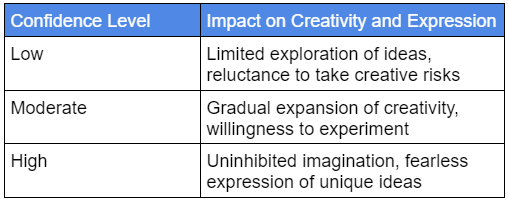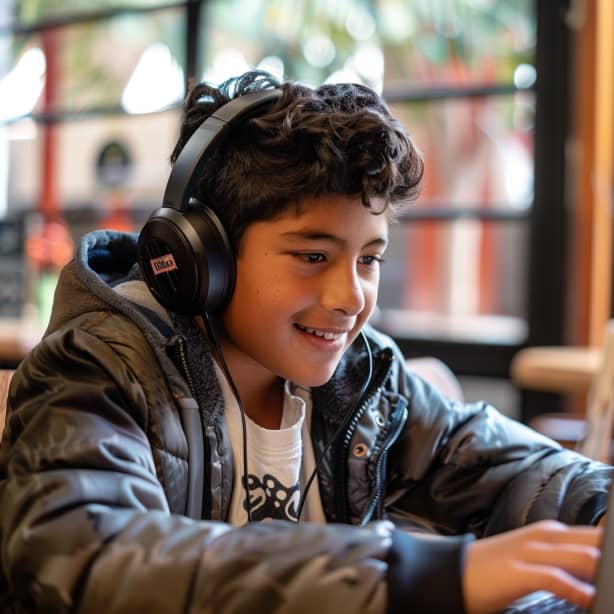Wondering how to boost your child’s writing confidence? You’re in the right place!
Developing writing confidence is often overlooked in the writing process so let’s dive in and take a closer look.
In this article, we’ll discuss:
- Why is writing confidence important?
- How does one become a confident writer?
- The connection between writing confidence and the willingness to take risks in storytelling?
- How confidence impacts a young screenwriter’s creativity and ability to express unique ideas
- What is writing confidence and why is it important?
Why Is It Important for Your Child To Be A Confident Writer?
Writing confidence is the dynamic force that empowers your child to express their unique voice, tap into their creativity, and enter the exciting journey of screenwriting with clarity and enthusiasm.
This level of confidence goes beyond the technicalities of learning screenplay structure and story development. It’s really about encapsulating the belief in one’s ability to craft compelling narratives. A confident young screenwriter is more likely to explore innovative ideas, take risks in storytelling, and embrace the joy of self-expression.
It involves not only having the skills to put words on paper but also the courage to share those words with the world. Writing confidence is the driving factor that transforms a budding writer into a self-aware storyteller ready to captivate audiences and leave a lasting impact with their stories.
Understanding the importance of helping your child become a confident writer involves nurturing their passion for telling stories that are important to them. When your child can connect to the power and purpose of STORY, new worlds open up to them allowing their creativity to soar.
This serves as the cornerstone for their creative development, influencing how they approach challenges, receive feedback, and ultimately, how they persevere in the face of writing obstacles.
Writing confidence instills a sense of pride and ownership in your child, fostering a positive attitude toward the creative process. As they navigate the complexities of story development for their screenplay, this confidence becomes the compass guiding them through the twists and turns of their exciting writing journey.
How does one become a confident writer?
Becoming a confident writer is a journey that unfolds through a combination of encouragement, practice, and being in a nurturing environment.
Firstly, acknowledging and celebrating your child’s unique voice and creative expression is crucial.
By providing positive reinforcement and recognizing their achievements, you contribute to building their confidence which directly affects their ability to become successful writers.
Additionally, creating a supportive writing environment plays a pivotal role in your child’s development. Providing a comfortable and inspiring space to write, coupled with the freedom to explore different ideas, including a culturally diverse array of narratives, encourages a sense of awareness in young writers that enhances their craft.
- Expose them to books that offer stories from unique perspectives.
- Watch foreign films that take a unique approach to storytelling.
- Read award-winning screenplays from around the world.
Lastly, fostering a growth mindset is essential.
Encouraging your child to embrace challenges they will come across in their writing. And to view mistakes as opportunities for learning. As the saying goes, writing is rewriting so your child will need to understand that improvement is a continuous process that contributes significantly to their confidence as a writer.
Here are four key points to help your child become a confident writer:
- Acknowledge and Celebrate Unique Voice:
Encourage your child’s individuality in storytelling, celebrating their unique voice and creative expressions. And help them to be vulnerable on the page. Journaling is a practice I often recommend to help aspiring screenwriters open up and get to the emotional core of their stories–because it’s the EMOTION that generates MEANING. - Create a Supportive Writing Environment:
Provide a comfortable and inspiring space where your child feels safe to express their point of view about the stories they want to tell. Provide access to diverse bodies of work from poetry, short stories, short films, novels, and foreign films to aid in their creativity. - Encourage Regular Writing Sessions:
Establishing a consistent writing routine is key to building confidence. Regular practice allows your child to hone their skills, develop a sense of discipline, and gain confidence in expressing their ideas on paper. - Provide Constructive Feedback:
Offer constructive feedback while gently guiding them to improvements. Positive and specific comments not only boost their confidence but also foster a constructive attitude toward refining their writing abilities.
- Acknowledge and Celebrate Unique Voice:
Becoming A Fearless Writer
Connection Between Writing Confidence and the Willingness to Take Risks in Storytelling
The relationship between writing confidence and the willingness to take risks in storytelling is symbiotic, influencing the depth and creativity of your child’s narratives.
Writing confidence acts as the catalyst, emboldening young screenwriters to step beyond their comfort zones and explore uncharted territories in their storytelling endeavors.
A confident writer is more likely to embrace the uncertainty of unconventional plot twists, unique character arcs, and daring narrative structures. This fearless approach to storytelling not only adds richness to their work but also distinguishes them as bold and imaginative storytellers.
To further understand the connection, consider the following three points:
Fearless Exploration:
Confidence empowers your child to fearlessly explore unconventional ideas and narrative elements, fostering a willingness to take risks in storytelling.
Innovative Story Structures:
A confident writer is more open to experimenting with innovative story structures, such as non-linear timelines or unconventional perspectives, adding depth and intrigue to their narratives.
Unique Character Development:
Writing confidence encourages the creation of unique and multidimensional characters, as writers feel secure in pushing boundaries and exploring diverse facets of their characters’ personalities and experiences.
How confidence impacts a young screenwriter’s creativity and ability to express unique ideas
Confidence plays a pivotal role in shaping the creative landscape of a young screenwriter. When your child approaches their craft with confidence, it acts as a catalyst for taking the brave steps to explore new perspectives.
A confident mindset liberates young writers from self-doubt (something that plagues most writers), helping them to feel more comfortable expressing their unique voices. This freedom to think outside the box not only enhances their creativity but also allows for the development of narratives that stand out in the world of screenwriting.
Confidence is the bridge that connects their imaginative ideas to the written word, empowering young writers to become vulnerable enough to create stories that inspire and encourage their audiences.
To illustrate this connection, consider the following chart:

Next steps
So when it comes to why confidence is important in writing it builds the foundation for your child’s path to screenwriting success.
A lack of writing confidence will negatively impact your child’s ability to connect with their projects and elevate their skills.
Now, take the next step in nurturing your child’s screenwriting journey by helping them lay the foundation of a strong story.
Get a free copy of my Magic Story Key and begin the process of building writing confidence in your aspiring screenwriter.
Wishing your child Happy Writing!


